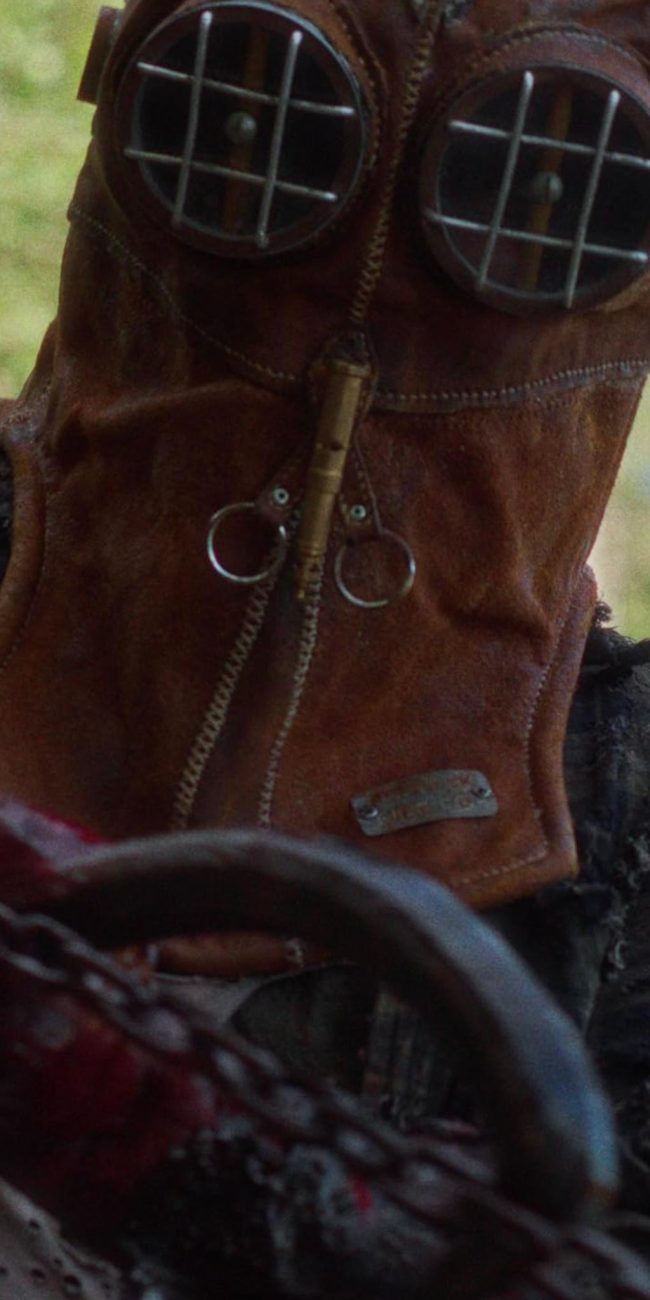A Conversation With Andrew Haigh (WEEKEND)
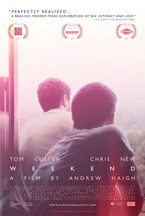 Andrew Haigh’s Weekend, which world premiered at the 2011 SXSW Film Festival and immediately turned into the discovery of the fest, has continued to charm audiences wherever it screens (I myself finally caught up with it at the Maryland Film Festival in May). In my “Hammer To Nail Pick of the Week” post at the Filmmaker Magazine blog, I had this to say about it:
Andrew Haigh’s Weekend, which world premiered at the 2011 SXSW Film Festival and immediately turned into the discovery of the fest, has continued to charm audiences wherever it screens (I myself finally caught up with it at the Maryland Film Festival in May). In my “Hammer To Nail Pick of the Week” post at the Filmmaker Magazine blog, I had this to say about it:
Believe what you’ve heard. Weekend is an incredibly special film. Over the course of just a few short days, it covers so much ground in its exploration of homosexual identity—beginning with having such flawlessly, deeply realized characters—that it’s hard not to believe strongly in this movie’s potential to become a mini-breakout hit. A gay friend jabbed to me, “It’s a gay movie for straight boys,” and though I disagree with that sentiment—I know gay boys (and straight gals) who love it too—in some ways I hope he’s right. Weekend likely won’t soar to the heights of Once, and it probably won’t change the minds of true homophobes and general simpletons, but by making these characters so three-dimensional and their relationship so compelling, Haigh has taught us all a very powerful lesson. And not just that budget doesn’t matter. I don’t know how he pulled it off, but Haigh and his team have made a movie that is firmly defined by its sexuality while transcending its sexuality at the exact same time. On its own humble terms, it’s as perfect as it could be.
On the day before the film was released in New York City thanks to Sundance Selects—it will be available on Video On Demand beginning September 30th—I met up with Haigh to discuss how this delicate movie came to be, his reaction to its success at SXSW, and his hopes for how it will be received. [Ed. Note: This is being first published the Monday morning after the opening weekend in New York City, and, by golly, it appears to have been received quite well!]
Hammer to Nail: I’ve been doing these pitch meetings for my next project at IFP’s Independent Film Week all week, which made me think of a story Tristan [Goligher, producer] told me at the BAMcinemaFEST opening night party about how you guys were pitching another project to someone that didn’t work out but then they asked what was happening with this one and when you said nothing they were like, “Let’s do that one!”
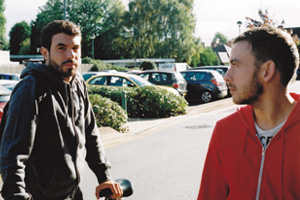 Andrew Haigh: I wrote a treatment for it, and I made a short film with the UK Film Council and Film Four, which are like the big funding bodies in the UK. And they were like, “We really like you, what’s next?” So I gave them this treatment for Weekend and they were like, “Yeah… NO.” [HTN laughs] They were like, “We don’t wanna do that. It doesn’t sound like anything’s gonna happen in the story. No.” So I went away, wrote a version of the script anyway, tried to get funding based on that, and again… no. I suppose it’s quite hard when you read a script that’s just full of a lot of talking for them to understand what it’s going to feel like visually and whether it’s gonna be interesting or not. So I don’t know. I think there’s probably a little bit of homophobia.
Andrew Haigh: I wrote a treatment for it, and I made a short film with the UK Film Council and Film Four, which are like the big funding bodies in the UK. And they were like, “We really like you, what’s next?” So I gave them this treatment for Weekend and they were like, “Yeah… NO.” [HTN laughs] They were like, “We don’t wanna do that. It doesn’t sound like anything’s gonna happen in the story. No.” So I went away, wrote a version of the script anyway, tried to get funding based on that, and again… no. I suppose it’s quite hard when you read a script that’s just full of a lot of talking for them to understand what it’s going to feel like visually and whether it’s gonna be interesting or not. So I don’t know. I think there’s probably a little bit of homophobia.
H2N: Probably just a little. [H2N laughs]
AH: Probably quite a lot. Under the surface.
H2N: I was going to get into the sexuality later but was the bracing intimacy of the sexuality written into the first treatment?
AH: Yeah, I think that kind of scared them. We got some comments back from people and they were just slightly weird. A, they couldn’t work out who the audience were. But they also would have preferred if it had been a coming out story, in the traditional sense. They probably could have got on board with that, but they just couldn’t quite seem to understand who’d be interested in this. So it was just, as you can imagine, really fucking frustrating. So I put it aside. Then I was writing another script for Tristan that I’m not directing, and then I went back to this and thought there was still something I wanted to do with it, rewrote it again, tried to get money again, same kind of response, and then luckily we found one company who’s based up in Nottingham, where we shot, and they gave us the money. And they were great. They were like, “Yeah, we love it, do what you want, don’t tone anything down.” If anything they wanted it to be as much as it possibly could be! [H2N laughs]
H2N: Let’s get into that question of how much is too much, or what’s the right amount. I think it’s vital in a movie like this. A lot of times in cinema sexuality is there for titillation or sales or nowadays to get the Strong Sexual Content box checked on the VOD menu. Here, it is really integral to the film and the story almost demands that it goes where it goes. How did you personally decide where to draw the line and how far to go? Did you actually shoot more and show restraint in the edit?
 AH: No, I shot pretty much what is there. It just made no sense to me to do something that is about this intimate encounter between these two people and not show the sex honestly and realistically, like everything else is shown. It just made complete sense to me. In the early days when I was writing the script, people were a bit worried about it being too explicit. I think there’s the fear that if you don’t tone it down then you won’t get the wide audience. But my point was always: I think the audience will respond to something that feels honest and realistic. That’s what an audience will respond to. I’m not going for multiplex audiences anyway. [HTN laughs] I’m never expecting it to be in massive cinemas where old people are gonna see it. The funny thing is, it’s not crazy explicit. Nowadays you get all kinds of more explicit sex in films.
AH: No, I shot pretty much what is there. It just made no sense to me to do something that is about this intimate encounter between these two people and not show the sex honestly and realistically, like everything else is shown. It just made complete sense to me. In the early days when I was writing the script, people were a bit worried about it being too explicit. I think there’s the fear that if you don’t tone it down then you won’t get the wide audience. But my point was always: I think the audience will respond to something that feels honest and realistic. That’s what an audience will respond to. I’m not going for multiplex audiences anyway. [HTN laughs] I’m never expecting it to be in massive cinemas where old people are gonna see it. The funny thing is, it’s not crazy explicit. Nowadays you get all kinds of more explicit sex in films.
H2N: It’s just the honesty of it. I try not to read the press notes before doing one of these conversations, but I caught a glance of you discussing the term “honesty” in yours, and the truth is that this isn’t a hard-hard R. It’s just that the bracingly honest and intimate way that it’s handled will likely make people shift in their seats because it feels like we really are in this room with these characters while they’re doing this.
AH: And ‘cause I shot it quite close, that’s what makes it feel like that. But actually, there’s no… there’s no erections. [HTN laughs] You watch something like Shortbus. That is explicit. This isn’t anything at that level.
H2N: With regards to the script, was it written word-to-word and beat-to-beat, almost like a play?
AH: Yeah, it was pretty much written as a screenplay. It’s hard when you’re writing so much dialogue, I want it to feel like if you watched it you would think, “Is this improvised? Is this not improvised?” And I want it to feel like that, to have that stumbling nature of real conversation rather than distinct movie talk.
H2N: And how long did that take, to get you to a place where you felt ready to shoot?
AH: About a year. I’m such a slow writer. I’ll write and then hate every single thing I’ve written, and then be furious and depressed for like a week and then go back again.
H2N: I don’t know what you’re talking about.
AH: [AH laughs] It would be so nice if it would be easy. People who are like, “Oh, I just have to write, and I write for hours on end.” I’m lucky if I can write for ten minutes. Rewriting is especially difficult, ‘cause when you first do it you’re like, “Whatever,” but it’s usually shit. Then you try and rewrite and you just get stuck, don’t you?
H2N: For me, the beauty of your film is how it transcends sexuality while also remaining firmly about that. Were you surprised at how the film came to multi-layered life as you wrote it, or were you actually quite conscious of trying to deliver on both of those ends at the same time?
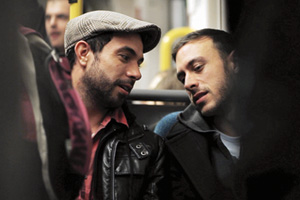 AH: It was quite conscious. For me, if I’m making a film about two gay people, I’ll actually want non-gay people to see it. Like, it’s important. And that’s partly why you make films like this. I don’t just want to play it to gay people who are gonna understand it and associate with it. I wanted it to have a wider impact. But also it’s almost like—for me anyway—if you’re writing something about two people, they’re more than just “gay,” ya know? You can’t define a person just by their sexuality. So it was obvious to me that I hoped that it would have some appeal outside that and there would be elements that would resonate beyond sexuality.
AH: It was quite conscious. For me, if I’m making a film about two gay people, I’ll actually want non-gay people to see it. Like, it’s important. And that’s partly why you make films like this. I don’t just want to play it to gay people who are gonna understand it and associate with it. I wanted it to have a wider impact. But also it’s almost like—for me anyway—if you’re writing something about two people, they’re more than just “gay,” ya know? You can’t define a person just by their sexuality. So it was obvious to me that I hoped that it would have some appeal outside that and there would be elements that would resonate beyond sexuality.
H2N: The whole movie is a delicate trick. Aside from homophobia, which I’m sure played a role, the truth is that it is a really, really difficult type of scenario with which to make a very good movie. This applies to the casting as much as anything else. First off, how long did it take to find these guys, and secondly, did the actors change the characters as they were written or did they manage to slip into the firm roles that you had created?
AH: The casting was quite a long process. When I started, it was terrifying me almost every day, because I knew that if we didn’t find good enough actors, the film would be an absolute disaster. Especially because I knew the way I was gonna shoot it, not with a lot of coverage. You just know that you can’t have bad acting in that, it’s just not gonna work. So when I saw these two together something sparked between them, and you could see there was something interesting that would come across as chemistry. When we were shooting, I never said, “You must say what’s in the script.” So there were certainly times when they would go off script. They would improvise stuff, they would add things, they would change stuff around. They learned the script, and then we would put it aside and see what happened on the day. Chris [New], especially, who played Glen, I thought that character could just be really irritating, really annoying, kind of like “look at me.” But he brought that bravado as well as the mixed up tenderness underneath that that slowly came out. I think his role is almost the hardest one.
H2N: Definitely.
AH: ‘Cause you could not like his character. Some people don’t like his character. But for me, by the end you really warm to him, I think.
H2N: It seems like you shot in sequence.
AH: Yeah, we shot in sequence. Shooting in order just makes so much sense. If I could do that all the time, it would make life so much easier.
H2N: For any project it’s a luxury, but for this one it’s almost like you have to. The tiniest thing that happens at any given moment could tweak things to the point where you have to continue down that new path.
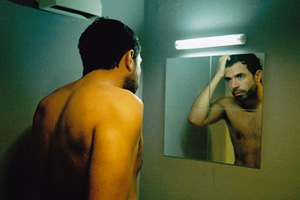 AH: Especially towards the end. As we got to those final scenes, it was good ‘cause in reality everyone was absolutely fuckin’ exhausted. So that helps, ‘cause they’re supposed to be exhausted and emotionally fraught. We weren’t entirely sure how to end it with Chris’s character, and through doing the whole film in order, when we got to him we were quite clear about what emotional state he was actually in.
AH: Especially towards the end. As we got to those final scenes, it was good ‘cause in reality everyone was absolutely fuckin’ exhausted. So that helps, ‘cause they’re supposed to be exhausted and emotionally fraught. We weren’t entirely sure how to end it with Chris’s character, and through doing the whole film in order, when we got to him we were quite clear about what emotional state he was actually in.
H2N: When we met at the SXSW filmmaker lunch—at Robert Rodriguez’s studio warehouse, no less!—it seemed like you guys really had no clue how this film was going to land with people.
AH: Yeah!
H2N: Had you at least shown people along the way to get some sort of sense of how the film was going to play?
AH: No, nobody. I had to sit in my bedroom at home, so nobody saw it apart from Tristan, and the two people who put the money in. And that was it. Nobody had seen it at all.
H2N: Was South By always a goal? We could get into this as well, but it seems like there’s a spiritual kinship between Weekend and some of the films that first made a name for themselves at SXSW.
AH: Definitely. It’s kind of two things. You know, you finish the film and see what festivals you can apply for at that time, but South By was always the one that I thought would be most suited for it. As you said, there are a lot of films that came out of that festival that I always really liked. I don’t know, there’s an atmosphere of films that exist within that festival that is quite inspiring. For me, it was great to be accepted.
H2N: But you still didn’t go in there Mr. Confident Man.
AH: Fuck no! [H2N laughs] I remember flying over, and just being like, “Okay, this is really scary.” You know, it’s not a festival known for having gay-themed work either. So I remember at our opening, when we first screened, the world premiere was on opening night and we were up against Source Code. Source Code’s got like 2,000 people who are gonna go and see it. And we had like 40 people in the screening room. I remember standing outside with my publicist. I said, “How many people are in there?” It was about a quarter of an hour before, and he said, “There’s only about four people,” and I was like, “Fuck, well, I’m going home, then. I’m really going home.” [H2N laughs] “There’s gonna be four people seeing the film!”
H2N: I remember bumping into the IFC team at the opening night party and they were seriously freaking out about it. But in a weird way I think the fact that only 40 people were in that first screening might have actually helped to build that festival discovery buzz right away. Did anyone from IFC come up to you after the film to express their enthusiasm?
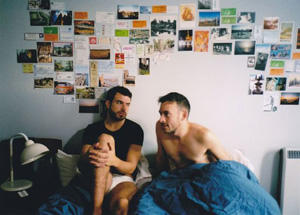 AH: Ryan [Werner] came up to me and said he really liked it. And then we heard from our publicist that they were maybe gonna put an offer in. We were just freaked out, really. I couldn’t quite understand it. I think it was in Hollywood Reporter like two days later, they said there was a “buzz” about this film, and we were just like, “What?! How does that happen?” It almost didn’t make sense to us. You make a film, and you just don’t know how people are gonna respond to it. So, it was kind of crazy. And still now, I find it hard to think about the film in those terms. If I read good press about it, it’s like, “Really? Is that the same film?”
AH: Ryan [Werner] came up to me and said he really liked it. And then we heard from our publicist that they were maybe gonna put an offer in. We were just freaked out, really. I couldn’t quite understand it. I think it was in Hollywood Reporter like two days later, they said there was a “buzz” about this film, and we were just like, “What?! How does that happen?” It almost didn’t make sense to us. You make a film, and you just don’t know how people are gonna respond to it. So, it was kind of crazy. And still now, I find it hard to think about the film in those terms. If I read good press about it, it’s like, “Really? Is that the same film?”
H2N: I honestly don’t think I’ve read any bad press about it.
AH: Everything’s been pretty good. The thing is, I’m really obviously happy about the response. And I am still genuinely surprised. I always hoped some people would like it, but I thought the reactions would be a lot more mixed. I really did think that. So I’m still quite surprised.
H2N: You’re screening at the London Film Festival, right? Will this also be a totally fresh set of eyes in your country?
AH: We haven’t shown anywhere in the UK.
H2N: Wow.
AH: So it’s really weird for us. That’s in October. And then we release in the UK in November, and Germany as well.
H2N: What is the UK release like? When did that fall into place?
AH: IFC happened first, then it kind of fell into place. But it’s weirdly been harder in the UK than it has been here. Like, there suddenly weren’t companies fighting to get the film in the UK. Most people were like, “Yeah, we like it but nah, it’s not really for us.” The UK’s a really funny market, especially for low-budget indie films. There are American films that never make it over there. Like, Joe’s [Swanberg] have never been released in the UK, and that is amazing to me.
H2N: We gave away a lot of world rights to IFC but our UK rights were available and everyone said no. It just wasn’t even an option.
AH: It’s so weird to me.
H2N: I was talking to documentary folks last night and they said it’s the same problem with nonfiction over there at the moment.
AH: It’s really frustrating, and I think it is partly the audience’s fault. I don’t just blame the cinemas. I do blame the audiences. They don’t give it a chance. Like, if your film is French, that’s fine, that’ll get into cinemas. But if you’re an American indie, or an English indie, and you’re kind of left field, people just don’t go and see them. It’s really frustrating.
H2N: Everyone always wishes they had more money, but did you fall in love with the way you made this movie and want to keep shooting the same way?
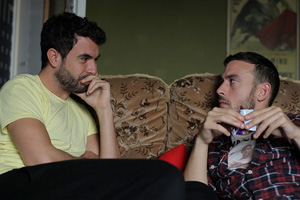 AH: It would be nice to have a little bit more money, ‘cause like you wanna get paid. [H2N laughs] It’s sort of like I love making films for no money, but how are you supposed to live? You know what I mean? To me it always depends on the project. If I can do it cheaply. Like I kinda think that when you make a film you should try and be financially responsible. It’s costing money, and you’re getting people to give you money to make a film. So I wouldn’t want to have made this film for a million dollars, ‘cause that’s a ridiculous amount of money and you don’t need that to make a film like this. But I think what scares me the most is the more money you have, obviously the less control you have. And I’m sure you were the same. When you make a film for hardly any money, you really do have control over it, and that’s really kind of nice. And then suddenly it’s out in the world and—even when you released yours it’s the same as this—even just having big companies involved in it, your control just slowly disappears a little bit, and it’s quite hard.
AH: It would be nice to have a little bit more money, ‘cause like you wanna get paid. [H2N laughs] It’s sort of like I love making films for no money, but how are you supposed to live? You know what I mean? To me it always depends on the project. If I can do it cheaply. Like I kinda think that when you make a film you should try and be financially responsible. It’s costing money, and you’re getting people to give you money to make a film. So I wouldn’t want to have made this film for a million dollars, ‘cause that’s a ridiculous amount of money and you don’t need that to make a film like this. But I think what scares me the most is the more money you have, obviously the less control you have. And I’m sure you were the same. When you make a film for hardly any money, you really do have control over it, and that’s really kind of nice. And then suddenly it’s out in the world and—even when you released yours it’s the same as this—even just having big companies involved in it, your control just slowly disappears a little bit, and it’s quite hard.
H2N: It changes the game for sure. Getting back to Weekend, with regards to the cinematography, was it shot-listed?
AH: No. When I wrote the script, because it’s pretty much like one shot per scene, I kind of knew in my head where the camera should roughly be in terms of movement and intimacy. So it was kind of planned in my head, but I always waited until we were on set to find the exact point. I did make a short film that I storyboarded and planned to a crazy degree [H2N laughs] and I shot it like that and then I was so disappointed! ‘Cause it’s never exactly how you want it to be. And so I can’t even watch that film now. It just depresses me. When you haven’t planned it to such a crazy degree, you’re like, “Ahh, that’s quite a nice choice.”
H2N: But I’m thinking of something specific like the shot when Russell [Tom Cullen] goes to the hetero bar to meet up with Glen and his friends, and Glen pops out from the background. It plays like a really beautifully choreographed moment of discovery, but it also could very well have just been a happy accident. And it doesn’t matter—either one of those is a treat. But was that a case of being loose and the movie gods granting you a tiny miracle?
AH: Some of those shots we just shot in nightclubs with real people, not extras, so we literally just got permission to shoot there and then we just turned up with loads of drunk people around. That whole nightclub section at the beginning, we probably shot that whole thing in about half an hour.
H2N: How did you do sound for that?
AH: There’s no talking in that nightclub scene so we just shot it mute and added music.
H2N: Wow, it felt so natural that I didn’t even stop to consider that’s how you did that. No dialogue helps!
AH: Especially when you’ve got no money, you can’t hire extras, and things like nightclubs look fucking shit if you’ve got people pretending to dance and pretending to, like, order drinks. [H2N laughs]
H2N: Especially since that’s such an early scene in your movie, establishing your hyper-naturalistic film with fake dancing would have been signing your death warrant.
AH: My DP [Urszula Pontikos] was great, but I think if she had been able to light the nightclub herself, it would have looked very different. And I quite like the fact that—it’s the same with the fairground later on—it’s like, we can’t add any lights, so let’s just try and make it as best we can. I quite like that. Some of the control is taken away from you. It’s nice.
H2N: Did you do a lot of color grading in post to tweak or enhance the image quality? I saw it in Maryland, and it seemed to have a very strong visual texture for something so apparently micro-budget.
AH: Not really. We shot on the [Canon] 5D, and it’s quite a nice image that comes from that anyway. But in the grade I think we just wanted a relatively mute palette. And I think it helps that we also used mainly natural light. It’s quite a good camera, and it looks good in natural light. I didn’t want it to look too video-y, too high-def-y. That’s just a bit gross.
H2N: You said that you didn’t get eyes on it or do test screenings, so how many rounds did you personally go through until you called picture lock? I guess the fact that you were shooting so many masters helped to provide more answers for you.
AH: Yeah, so it’s those choices on what’s the best master and just obviously the in-and-outs, and the kind of tonal stuff. It was quite hard. I still wasn’t convinced, even when I locked picture I wasn’t convinced that it worked at all. I find it very hard to be objective about it, so I was like, “I don’t think it’s working.” And then I showed it to Tristan and he was like, “It does work. I think it does work. It’s good, don’t worry about it!” [H2N laughs] But it took me a while to feel like it was working.
I don’t like showing edits to people. I think I’m quite delicate when it comes to criticism. And you yourself know the things that work as well as the other bits. You know that. So I don’t really need someone to tell me that, ‘cause I know that already. And so it’s like, “Okay, I’m just gonna get through it, do it, and try to make it the best I can.”
H2N: Was even Tristan not seeing cuts along the way?
AH: No.
H2N: Wow.
AH: He’s really good. We’ve got a good relationship. He just lets me do it. I mean, he did see a couple of cuts, more towards the end when we were doing the fine cut he saw it. But he gave me a good six/eight weeks before he saw anything. So it was good.
H2N: I think this is a really interesting time for all of us. Being on the filmmaking side of things this year as well as the press side, I’m pretty daunted by the reality that so many movies are coming out and nothing has the time or space to land and grow.
AH: It’s really sad, I think.
H2N: I trust that these movies will be discovered, but at this moment we haven’t had our Winter’s Bone of 2011, and I really hope your film is the one that can escape the tiny bubble our world is trapped inside.
AH: It’s gonna be an interesting thing, ‘cause, you know, it’s all very well if it has good press, but people have still gotta go to the cinema.
H2N: I’m not just saying this because I’m talking to you, but Weekend has that magical sense of discovery that makes me think it might become a breakout in at least some sense of that word.
AH: The thing is, if the gay community doesn’t come out ‘cause they’re just in bars on Friday and Saturday night, then the film won’t do well. That is still gonna be the core audience. And so if they don’t come out, which could easily happen, then the film won’t do well. And it’ll probably make me angry, ‘cause gay people—myself included—complain all the time about how there’s no good gay films. And then there is one that people think is alright but you don’t go and see it? You’ve only got yourself to blame.
— Michael Tully









